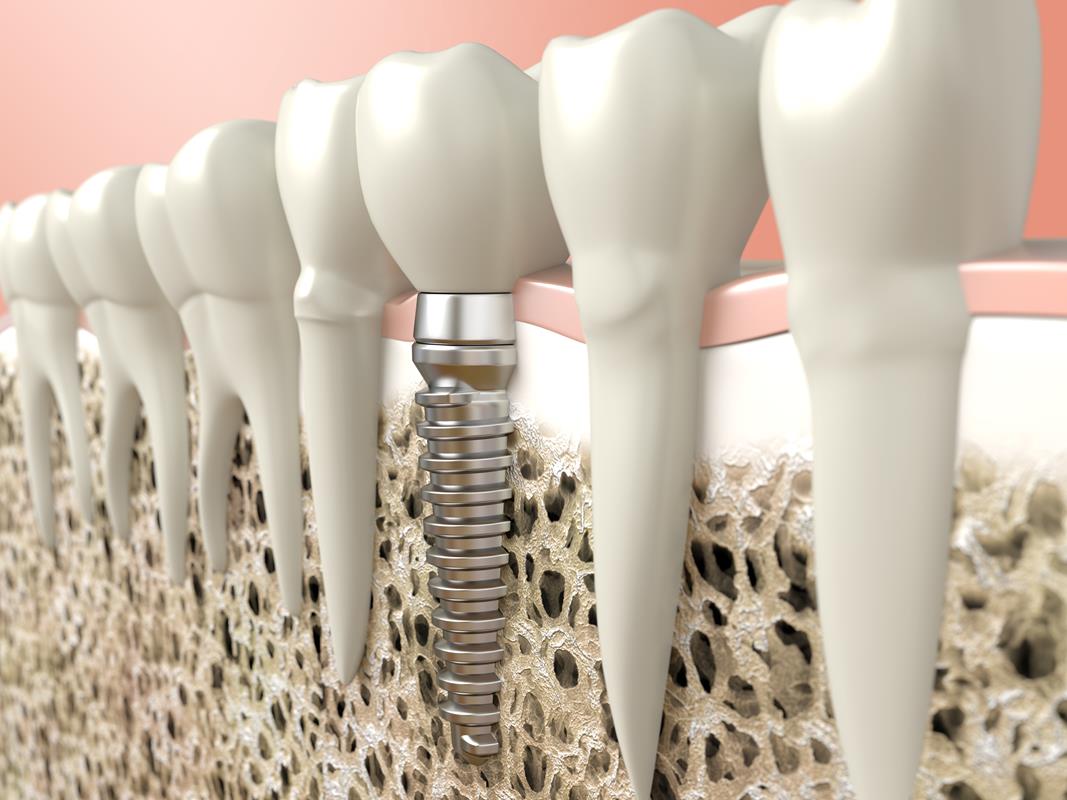
Periodontal Services
Periodontics is a specialized branch of dentistry that focuses on the prevention, diagnosis, and treatment of periodontal disease as well as the process of replacing teeth with dental implants. Periodontists receive up to three years of additional, specialized training in treating periodontal disease and other conditions.
Dr Bloom will instruct you on the unique “Poke and Sweep” method of plaque removal with a toothbrush that he developed on his own 40 years ago.

Crown Lengthening
For patients who believe that their smile is too “gummy” or that their teeth are too short, we are proud to offer crown lengthening services to fix those concerns. Crown lengthening procedures are done to expose more of the tooth and remove extra gum tissue. By doing this, we can reshape your gums and help give your teeth the look and shape you desire. In addition to the life-changing results, crown lengthening is a minimally-invasive procedure that will allow for a more balanced, even smile.
The recovery time for the crown lengthening procedure is approximately three months. As your gums heal, you’ll be able to resume normal habits and functions. In recovery, you will be asked to avoid demanding activities during the first two to three days after your operation. Some patients report mild discomfort during the procedure and increased sensitivity after the treatment is complete, but with a personalized treatment plan we can help manage any discomfort and pain. Moving forward, practicing good oral hygiene is paramount.

Dental Implants
We are proud to offer dental implants for our patients. Dental implants are roots placed in your mouth for either permanent teeth to be placed on or ones that you can remove.
Dental implants are done to improve a patient’s smile and usually their self esteem. Having missing or bad teeth can be quite embarrassing. Dental implants also can be done to improve oral health. Many people find it easier to eat with dental implants. Their speech can also be improved. Dental implants are also more comfortable because they are made to become permanent.

Gum Grafting
Gum grafting treatment for receding gums works best for patients who are suffering from more extensive gum loss where gum disease cannot be resolved by a professional cleaning alone. This procedure can help repair the damaged area of the gums and work to prevent further gum tissue loss. In addition to stopping recession, gum graft treatment will better protect the roots of the teeth from decay by giving the patient more gum line, and reduce tooth sensitivity to hot and cold foods.
During a gum graft procedure, the patient doesn’t feel a thing as we use a local anesthetic to keep them pain-free. After the operation, the patient may experience some soreness and slight discomfort, which can be effectively treated with a combination of rest, cold compresses, and, if needed, prescription medication. With proper care, the gum graft will protect the previously exposed root and serve as a healthier gum line, restoring your smile and confidence.

Periodontal Disease Treatment
Periodontal disease is a serious issue that affects many people’s lives. Luckily our experienced periodontists are capable of treating periodontal disease in our patients, a field in which they have rigorous training and education.
The cleaning of calculus, or tartar, is a major component of treating periodontal disease. However, changes in the patient’s behavior are just as important. Making sure your dental hygiene habits are up to par is critical in the treatment of periodontal disease.
Your teeth are meant to last a lifetime, so it is critical to properly care for them. If you have periodontal disease, don’t feel hopeless. It is a treatable disease, but one that requires the patient to be aware and active with their dental care.
request an appointment
Scaling and Root Planing
Scaling and root planing are a more in-depth, thorough cleaning treatment recommended for patients who may be suffering from periodontal disease. Also known as gum disease, this type of gum infection is caused by bacteria and plaque forming on your teeth over time and causing inflammation. While serious, periodontal disease is treatable. However, it can lead to bone or tooth loss if not treated quickly.
After the scaling is complete, we will move onto root planing. The root planing technique is used to smooth out the tooth’s root and ultimately remove the pocket caused by bacteria. When the root has been effectively smoothed, the gums can be reattached and have a greater chance of fully healing.
Some patients report mild discomfort during the procedure and increased sensitivity after the treatment is complete, but with a personalized treatment plan, we can help manage any discomfort and pain. Moving forward, practicing good oral hygiene is paramount for making sure that periodontal disease doesn’t become worse after seeking initial treatment at our office.

Gum Disease
Gum disease, also known as periodontal disease, is the primary cause of adult tooth loss.4 out of 5 people have some form of Periodontal Disease and don’t know it because it is so easy to get and is painless until the advanced stages. Unlike decay, which often affects 1-2 teeth at a time, gum disease can affect groups of teeth in each area of the mouth at the same time.
Signs of gum disease include:
- Red, slightly swollen gums, (or tender gums in either late stage disease or an acute phase)
- Bleeding gums while brushing or flossing around the gumline
- Looseness of teeth
- Pus between gums and teeth if you press on them
- Persistent bad breath, bad taste
- Change in bite or teeth drifting out of position
The early stage of gum disease is called Gingivitis and is confined to the gums. Bacterial plaque that grows around the teeth and under the gum line causes a low-grade inflammation that is visible as a subtle redness and the gums bleed easily if brushed. Dr. Bloom can teach you how to eliminate gingivitis.
Periodontal disease is beyond gingivitis and reflects a chronic inflammation and infection of the gums that has progressed inward and now affects the bone that supports the teeth. Bone is not stable in areas of chronic inflammation and dissolves away. Advanced bone loss corresponds to gum recession, increasing looseness and sometimes drifting of teeth. X-rays are required to see bone levels.
Avoiding periodontal disease is an important reason why you should call Dr. Bloom to schedule regular dental check-ups. Good oral hygiene and regular professional cleanings are key to preventing periodontal disease.
Dr. Bloom is often able to treat gum pockets deepened by periodontal disease in the early stages with thorough cleaning of the tartar and plaque in all the areas below the gum, but he may need to perform a deeper cleaning that includes scaling and root planing for more moderate to advanced stages. Scaling removes the tartar from above and below the gum line, and planing smoothes out the rough spots on the tooth root. Following this procedure and improved daily hygiene, the gum tissue heals and the pockets shrink resulting in healthier gums. If deep bone defects remain, further periodontal therapy may be required.
Dr. Bloom performs a 3-part professional dental cleaning. His instructions for your daily home care are unique and are possibly the MOST VALUABLE lesson for you to learn. It is by incorporating his unique methods into your daily hygiene routine and by returning on a regular basis for confirmation of your successes (2-3 times/year) that you can PREVENT the most common dental problems from recurring.
Chronic gum disease sufferers are at a higher risk for other diseases, making it more critical than ever to maintain periodontal health in order to achieve overall health.
Chronic gum inflammation can be a factor whereby diabetics have more problems controlling their blood sugar. The same chronic inflammation might be a factor in chronic kidney disease. People whose bodies show evidence of a reaction to the bacteria associated with periodontal disease may have an increased risk of developing cardiovascular isease.
Pregnant women who have periodontal disease may be 7 times more likely to have a baby that is born too early and too small.
If you feel you have any of the symptoms of gum disease described above, call Dr. Bloom and set up an appointment to evaluate your periodontal condition and he will recommend appropriate treatment.